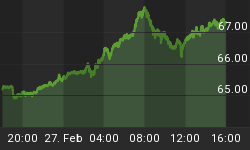The following is part of Pivotal Events that was published for our subscribers February 10, 2016.
Signs of The Times
"The capital spending slump that originated in the hard-hit energy sector appears to be spreading more widely across other U.S. Industries."
- Reuters, February 2.
"Toxic Loans Around the World Weigh on Global Growth"
- NYT, February 3.
"81% Think Federal Government Corrupt"
- Rasmusson, February 4.
"Chinese brokerages posted 'ugly' earnings for January."
- Bloomberg, February 5.
Perspective
Well, the polite way of saying it is that the markets have had a "nasty shock".
Shocked included lower-grade bonds and bank stocks, particularly European banks. The latter may have had too much faith in Draghi's oft-repeated vows to do "what it takes" to inflate anything that trades. The boast would only appear successful so long as there were enough believers to place bids. Then in a world of plenty - they ran out of "greater fools".
And this makes the point that central bankers need speculators to leverage up. Then the problem is that once prices stall out the power shifts to margin clerks. This was the case when the Fed used to increase administered rates in following the rise in market rates.
The really big problem now is that central bankers joined the party and became fully leveraged against soaring asset prices. They thought they had invented a perpetual motion machine.
Back in the day, Mister Margin had only to attend to private accounts and a few sovereign borrowers such as Egypt or Bolivia. Under the biggest intellectual and practical blunder in financial history central bankers will be receiving margin calls.
As the saying goes, "The problem has been promiscuous lenders and promiscuous borrowers". Central bankers should be prudent, not promiscuous.
To look to the brighter side, probity will return.
Stock Markets
Where are we?
We remained positive until May, when the old Dow Theory determined that the bull was over. Shanghai registered impressive Upside Exhaustions in June. Our July 7th "Special" concluded that most banks were a nice "Widows and Orphans" short. Credit spreads reversed in June and "broke out" in late July. This followed the pattern set in the disasters of 1998 (LTCM), 2000 and 2007-2008.
Technically, the key on the S&P rolling over was attempting to get above the 50-Week moving average. And then failing, which occurred in early November. The senior indexes taking out their October 2014 lows formally set the bear market. This was anticipated by the Transports, which took out the 2014 lows in the August hit.
How long will the bear last?
Typically, about 18 months. In using 2009 as an example, for the senior indexes it should end with a number of Downside Capitulations.
In the meantime, financial markets are having a hit equivalent to Shanghai's into August 24th.
European banks could be setting a "Black Someday", any day now.
In looking at yesterday's action in Europe, perhaps a "Grey Tuesday" is sufficient to clear immediate imbalances.
Indeed, Deutsche Bank (DB) is registering a Weekly Downside Capitulation - right now.
A relief rally that could run into March-April seems likely.
On the bigger picture, there could be a number of significant "hits", each at lower levels until the bear ends.
Link to February 12, 2016 Bob Hoye interview on TalkDigitalNetwork.com: http://talkdigitalnetwork.com/2016/02/european-banks-and-stocks-take-a-pounding
Listen to the Bob Hoye Podcast every Friday afternoon at TalkDigitalNetwork.com















